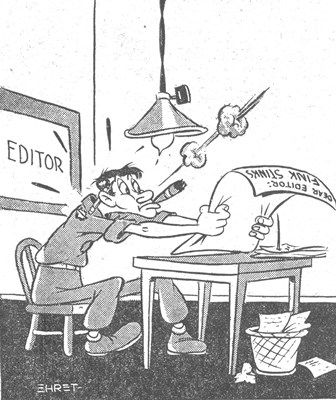|
Herwig said the book "isn't risque" but is "just history." He said he wrote a similar piece while a student at the University of California but guessed it must have been pretty dull. "She took the same stuff and made it - well, more realistic," said Herwig. |
|
The jury voted to continue investigations into the riots which caused breakage of plate glass windows, alone estimated at more than $25,000. Twelve people also lost their lives in fatal accidents. There had been no previous report of any rape cases by the police. |

Vol. III No. 52 Delhi, Thursday, Aug. 30, 1945 Reg. No. L5015
What To Expect Upon Returning To Civilian Life WASHINGTON - (UP) - Out of the hundreds of veteran's laws already passed by Congress and the scores now in the mill there emerged this week a few things on which the returning soldier can depend. These boil down to (1) mustering out pay of from $100 to $300; (2) disability compensation, if needed, ranging normally up to $115 per month for total disability, plus hospitalization; (3) education for at least a year, and more if schooling was interrupted by Service; (4) compensation, if unemployed, of up to $20 weekly for as many as 52 weeks ($100 monthly for self-employed); and (5) limited help on a loan for a home, farm or business - the government puts up no money but guarantees half of a loan up to $2,000. JOB ‘GUARANTEES’ Nobody has yet guaranteed the veteran the thing most wanted - a job. Maj. Gen. Lewis B. Hershey, draft director, told a meeting of draft officials in Boston this week that the right of veterans to their peacetime jobs expires with the war emergency. Hershey said that a job guarantee was contained in the Selective Service law, which was passed, not for all time, but for what was thought might be a years training period. After the meeting, Hershey declared that sections of the legislation concerning guaranteed job return "will be abolished automatically when Congress terminates hostilities." However, returning veterans were assured the next day by President Truman that, if necessary, he will ask Congress for new legislation to protect their right to their old jobs if they want them. Scores of other benefits are on the books, much broader aids have been promised, and many others have been written into bills. However, except for mustering-out pay, there are "ifs" tacked to almost everything a veteran may get. CHANGES DUE When Congress reconvenes it will be asked to make many changes in the various veterans bills. Already passed by the House and awaiting Senate approval are amendments that will make the G.I. Bill of Rights more liberal. Chief of these proposed amendments would be a loosening up of loan requirements. So far relatively few veterans have taken advantage of the loans, charging the restrictions made them almost impossible. School provisions would be liberalized to allow the government to pay tuition and fees for high-cost correspondence or vocational courses, as well as present college and academic courses. Living allowances for student-vets would be increased $10 monthly from the present $50 for unmarried vets and $75 for those married. Another revision, already approved by both Houses but in slightly different forms, would raise disability payments in response to numerous claims that $115 per month is not enough to live on. |
U.S. Troops Enter Japan; MacArthur Selects Palace Of Emperor For His H.Q.
American airborne troops landed at Atsugi, only 18 miles from downtown Tokyo, early Tuesday and the Allied occupation of Japan had begun.
As Adm. William Halsey's Third Fleet, with attached British units, rode at anchor in Sagami Bay, 38 transport planes came into Atsugi, acting as an advance party for Gen. Douglas MacArthur and his airborne party, scheduled to land two days later. The initial party was composed of specialists to prepare the field and set up a radio station.
MacArthur, who will set up his headquarters at Hirohito's summer palace at Hayama, 27 miles south of Tokyo, advised the Japs that Lt. Gen. Robert Eichelberger's Eighth U.S. Army will begin swarming ashore at Yokohama and at Tateyama-Hojo on Friday.
The Navy started the beginning of the triumphal parade into Japan proper. As 1,200 planes roared overhead, Halsey's Third Fleet, with the admiral aboard the flagship Missouri, entered Sagami Bay, just outside Tokyo Bay. Halsey anchored his ships in the shadow of Mt. Fujiyama. Accompanying the U.S. force were the British battleships Duke of York and King George V. A transport carrying 10,000 Marines was also among the group.
Two hours before entering Sagami bay, the Missouri took aboard Japanese emissaries for reports on minesweeping and to issue instructions for the later scheduled landings. Halsey himself, refused to see the emissaries. But before he allowed them to meet with his staff he had them stripped of their ceremonial samurai swords which they were allowed to retain at meetings with the Army in Manila.
The landings were postponed due to typhoons raging around Japan. Originally the airborne troops were scheduled to land Sunday, with the large scale occupation forces coming in on Tuesday.
It is expected that around 500,000 American troops will be in the Japanese homeland by the next six months. MacArthur has ordered the Japs to prepare for U.S. landings on the southernmost home island of Kyushu on Spt. 4 and 5. He also stated the U.S. will occupy the southern half of Korea.
The picture was slowly being clarified in areas other than the Pacific. In China, the Japs had already conferred with representatives of the Chungking Government, and it was announced the formal surrender of Jap forces in China would take place at Nanking.
The Japs had contacted the Southeast Asia Command and Army News Service said the formal surrender of the Nips in the Lord Louis Mountbatten command would take place at Singapore. Resistance seems to have ceased in Manchuria and the Soviets were reported having stockades built to house the POW's from the Kwangtung Army. The Reds have started establishing military administrations in Manchuria. Premier Stalin has announced the Russians control all of Manchuria and have occupied Paramushiro in the Kuriles and all of Sakhalin Island.
The Japanese forces at Hong Kong have been ordered by MacArthur to surrender to British Admiral Harcourt after Aug. 31.
Early China G.I.’s To Go Through India-Burma Theater
KUNMING, CHINA - The first group of surplus troops, 1,000 men, mostly members of the Mars Task Force assigned to the Chinese Combat Command in China, reached the newly-established Kunming area port of debarkation just five days after Japan announced it had accepted the Allied terms.
An additional 2,000 troops are expected this week. Col. Norman McNeil, staging area commander, declared that only a percentage of the men will be shipped home. Shortages of certain types of personnel will be filled by men passing through the staging area. Until definite instructions are received from the War Department, he stated men going home will be mainly selected from those having 85 or more points, although consideration will be given to length of overseas service and lack of suitable assignment.
The colonel said there will be definitely no close order drill or calisthenics. It is expected the staging area will probably be moved to the coast in the next few months. At the present time a man is sent to Calcutta, India, if he is going home by sea and to Karachi if he is going by air. The Theater replacement Service revealed earlier it was still accepting personnel requisitioned from the States and India-Burma.
|
AAF CHESS CHAMPS MEET IN CALCUTTA CALCUTTA - Chess champions of the Army Air Forces in the I-B Theater will be crowned in Calcutta next week when 16 regional winners meet in the finals of the AAF Special Services chess tournament. Preliminary play of the Theater tournament, selecting the finalists, has been in progress for the past month. |
Red-Sino Treaty For 30 Years
CHUNGKING - (ANS) - Russia and China signed a 30-year "friendly collaboration" treaty this week wherein both parties agreed "to act according to the principles of mutual respect for sovereignty and non-interference in internal affairs."
Terms of the new pact are: (1) Russia will give China moral support and material resources, such aid being given entirely to the Chiang Kai-shek regime as the Central Government of China; (2) both parties to work in close and friendly collaboration after the coming peace and to act according to the principles of the sovereignty and territorial integrity, and of non-interference in internal affairs, of the other contracting party; (3) Soviet forces will withdraw from Manchuria completely within three months after the Japanese surrender; (4) the Chinese Eastern Railway and South Manchurian Railway will be combined and jointly owned and operated for 30 years, then revert to China; (5) the port of Darien will be open to commerce of all nations under a Chinese mayor and a Russian harbor-master; and (6) Port Arthur will be used jointly as a naval base with Russia in charge of its defense and China its civil administration.
At the same time, Chungking also announced that China Communist leader Mai Tse-Tung has accepted Chiang Kai-shek's invitation to meet soon and discuss their problems.
Chinese Soldier Flies The Hump In Wheel Well
HQ., FIRST COMBAT CARGO, BURMA - How'd you like to fly The Hump in the wheel well of a C-47?
Well, it has been done.
When S/Sgt. William Wollerton, Jr., crew chief, went to "safety" the landing gear of a combat cargo plane a few days ago just after the aircraft had completed a particularly rough trip from a Burma base to a remote field in China, he found a Chinese soldier huddled in the top of a wheel well.
CAUGHT IN GEAR
"You gotta pass?" asked Wollerton.
The Chinese only groaned. The crew chief looked closer and saw that one of the man's hands was caught in the landing gear mechanism.
An engineering detail jacked up the plane and extricated the hapless Chinese, who had broken his wrist and two fingers when the wheel folded into the well after the take-off.
FLIES 500 MILES
Upon questioning, the man disclosed that he did not know that the wheel of a plane retracted in flight. Home-sick for China, he thought a wheel well would be a secluded compartment for a Hump trip.
As the wheels came up, he squeezed himself into the small space between the landing gear and the belly of the plane, and in that cramped position flew more than 500 miles, sometimes at altitudes of more than 14,000 feet.
Wages Winning Battle Against Disease
By SGT. ART HEENAN Roundup Staff Writer
The dictionary defines medicine as "a science dealing with the prevention and cure of disease," but when the U.S. Army Medical Corps arrived in what is now the India-Burma Theater it quickly discovered that an ounce of prevention was worth 10 pounds of cure.
Preventive medicine and the means to instrument it have been pounded into military personnel in this Theater, disease-ridden as it is by epidemics among local populations.
The results were illustrated to us this week by Theater Surgeon, Brig. Gen. James E. Baylis. Pointing to charts in his office, the Theater Surgeon showed the following results:
The admission rate to hospitals for all diseases is just a little more than half what it was in 1943 and 1944.
Out of every 1,000 men in the Theater, only 15 are being hospitalized annually for malaria. This is only one-eighteenth the rate in 1943 and 1944, a drop that can only be classed as phenomenal.
LESS THAN HALF
Admission rate for diarrhea and dysentery is less than half what it was this time in 1944.
The venereal disease rate is about the same as for troops in the U.S.
So going by Al Smith's credo of "Let's go by the record," preventive medicine has paid off.
The Theater Surgeon ascribes the figures to indoctrination of the importance of disease prevention among troops, improved enforcement of preventive measures, cessation of combat activities. He points out that personal hygiene has improved, with bettering of area sanitation, and that use of suppressive atabrine has prevented malaria. Excellent planning by the Medical Department carried out energetically by troop commanders to obtain the highest sanitary conditions, have made this health record possible, he stated.
Since the war is over and all of you are looking forward to going home, we took advantage of the situation by asking the Theater Surgeon some questions that, according to the G.I. grapevine, you have been asking yourselves. To a high-ranking medical officer some of the questions would seem silly, but the Theater Surgeon has been in the Regular Army a long time, and G.I. rumors are an old story to him.
NO STERILITY
To simplify matters and to leave no doubt in your minds as to the rumors and what they amount to, we'll put them in question and answer form.
Q. "Is it true that long service over here results in sterility?"
A. "There is absolutely nothing to that rumor."
Q. "Is it true that men leaving here with recurrent malaria will suffer all through civilian life with it?"
A. "There are two types of malaria that affect us out here. One is the benign tertian type, rarely serious, and the other, malignant tertian. If the latter isn't treated it may be fatal. Fortunately, what is called recurrent malaria is the benign type. It can be and is suppressed by atabrine. I think I can best quote the Surgeon General of the Army, Maj. Gen. Norman T. Kirk, to complete the explanation. Gen. Kirk has written, "When a man with benign malaria stops taking atabrine, the usual symptoms - chills, fever, headache and nausea - may appear. But in the majority of cases, the disease has run its course after a man has suffered a few relapses, and no permanent damage has been done. Out of 1,000 cases, about one-third will have only one attack. There will be about 40 out of 1,000 who will suffer 10 relapses and only about one in 1,000 will have as many as 20 attacks. Relapses become less acute as time goes on."
AMOEBIC DYSENTERY
Q. "Some men fear that when they get back to the States attacks of amoebic dysentery will recur after they have been discharged from the Army. Is this apt to happen?"
A. "It might recur in some cases. But in my opinion it would only affect a few of the cases we have treated out here. We keep a strict registration of men contacting that disease in India-Burma. After a patient is discharged, we make him return later for further tests. In case of any doubt, he is again hospitalized until all traces of the disease have vanished."
Q. "Is prickly heat apt to recur when one returns to the States?"
A. "There are, of course, certain sections in the U.S. where prickly heat is prevalent. But unless one lives in those areas (and the chances are he had it before he came out here if he is susceptible) there will be no recurrence of prickly heat."
Q. "Is it true that atabrine leaves one's skin permanently yellow in tinge, does it lower one's vitality, or does it affect the liver?"
A. "It does none of those things. I understand that Japanese propaganda was spread among Allied troops in Burma to that effect. But all it amounts to is propaganda. Some men are allergic to atabrine, just as some are allergic, say, for example, to milk. But we soon discover when a man is allergic to atabrine, and he is taken off atabrine and put on quinine or possibly moved out of the malarial zone."
So much for the current rumor situation. We believe that at least in the cases of rumors like these, most of which are common knowledge, you can now write to the little lady and enclose the clipping with the comment, "You won't have to use that quarantine sign, 'Stay away, he's from India-Burma,' after all."
ONE MEDIC AT FIRST
At the present time the Medical organization under the overall supervision of Theater Surgeon Baylis can be numbered in the thousands. In 1942, when the Stilwell mission arrived, there was only one medical officer out here, Col. Robert E. Williams, who was appointed Theater Surgeon for the CBI.
When the Stilwell mission arrived the battle of Burma had started. Williams obtained help from Dr. Gordon Seagrave, who was commissioned a major in the Army, and two other U.S. medical officers were obtained from Chungking. These medics found that the Chinese Sixth and Fifth Armies, numbering 100,000, were spread over 300 miles of terrain and had only five Chinese graduate doctors and nine ambulance trucks at their disposal
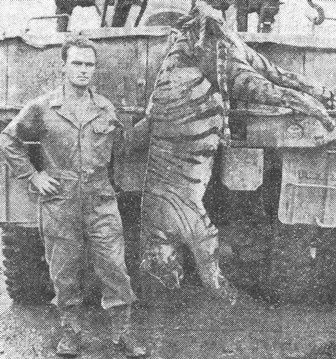 Lt. Charles L. Wadsworth, QM Truck officer, was tooling along in his jeep outside Dibrugarh, Assam, when this short-sighted tiger
came barreling out of nearby jungle undergrowth and jumped head first onto the jeep. While the tiger tenderly pawed its aching head,
Wadsworth borrowed a long-bladed dau from a passing Indian and slit the animal's throat from here to here, killed him.
Wadsworth is 17 months out of Richmond, Va.
Lt. Charles L. Wadsworth, QM Truck officer, was tooling along in his jeep outside Dibrugarh, Assam, when this short-sighted tiger
came barreling out of nearby jungle undergrowth and jumped head first onto the jeep. While the tiger tenderly pawed its aching head,
Wadsworth borrowed a long-bladed dau from a passing Indian and slit the animal's throat from here to here, killed him.
Wadsworth is 17 months out of Richmond, Va.
|
The Americans and Chinese, with medical supplies furnished by the British, did what they could with their pitifully small force. Ten small hospitals were established with the U.S. doctors traveling between each one by jeep. Burmese nurses were utilized to nurse the Chinese wounded.
1942 RETREAT
The future trail of American medicine and the shape of things to come were blazed by Williams' American medical knowledge when Uncle Joe Stilwell and his column retreated from Burma into India. All of the personnel were suffering from malaria, infected cuts, leech bites, and foot sores. This was the only column to come out of Burma without a single death resulting. This column was under the direct supervision of American officer Williams.
Gradually, then speedily, the Medical Corps built up modern facilities out here, always preaching its doctrine of prevention. At the end of a 15,000 mile supply line, the longest supply line in history faced by almost insurmountable transportation difficulties, surrounded by infection and epidemic, battling in the midst of jungle and mountain, drenched by the monsoon, the Medical Corps went ahead with its plans and building.
Two duties faced the Medical men. One was improving the combat efficiency of the Chinese Army, the second was taking care of American troops out here.
P. S. HOSPITALS
That the former objective was accomplished was evident by the record of the Chinese armies in Burma after Stilwell started his Northern campaign. American portable surgical hospitals and liaison teams accompanied the Chinese, whose medics had American instruction. Just to illustrate, Brig. Gen. Pinky Dorn's Y Forces, operating on the Salween front, had 10 portable surgical hospitals and three field hospitals of three platoons each at their disposal.
That the second objective, taking care of American troops, was accomplished, is evidenced by the statistics that were presented by the Theater Surgeon in the beginning of the story.
Four Sad Sacks Hit Mail Jackpot
KURMITOLA, INDIA - Their beer ration cards punched empty, their sad hearts filled with self pity, four Bengal Wing G.I.'s struck upon the happy thought of revealing their unhappy plight - caused by scarcity of female mail from Uncle Sugar - to the editor of the Tulsa (Okla.) Tribune.
That was a month ago.
This week the quartet received more than 300 letters and every mail call swelled their total. What a problem!
Pfc. Albert J. Johnson, Cpl. James Lavis, S/Sgt. Herb E. Lawrence and T/Sgt. Edwin D. Isaacs - all former residents of Tulsa - composed the "beer-scented" letter to the editor, which the Tribune printed in full.
And in poured the letters.
One lady describes herself as a "buxom lass of fifty," who writes 264 letters to Servicemen each month. Another - all of 16 - professed her love for "each of you." And a 29-year-old promised to send some "delicious" pin-ups of herself.
It being physically impossible to answer all letters received, the Favored Four each chose 10 letters to answer. (Each of them wrote the gal for pin-up pictures).
P.S. - The mail clerk hopes the idea doesn't spread.
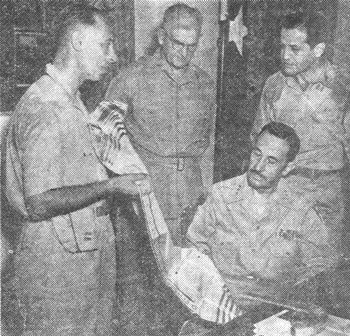 During discussions of celebration of the coming Jewish New Year, Chaplain Samuel Horowitz, left, shows Lt. Gen. R. A. Wheeler,
Theater Commander, seated, a prayer cloth. Theater Chaplain Edward L. Trett, center, and Harry Herbert, field director of the National
Jewish Welfare Board, look on.
During discussions of celebration of the coming Jewish New Year, Chaplain Samuel Horowitz, left, shows Lt. Gen. R. A. Wheeler,
Theater Commander, seated, a prayer cloth. Theater Chaplain Edward L. Trett, center, and Harry Herbert, field director of the National
Jewish Welfare Board, look on.
|
WHEELER'S GREETING
FOR JEWISH HOLIDAY
Roundup Staff Article
Jewish personnel in the India-Burma Theater will observe the New Year and Day of Atonement in the Jewish Faith with special religious services from Karachi to Burma.
Theater Commander, Lt. Gen. R. A. Wheeler, has issued the following statement to members of the Jewish faith in his command in recognition of their coming holidays:
"At this Jewish New Year Season, it is the solemn and sacred annual custom of the Jewish people to take a spiritual inventory with a view of self-improvement of the individual and all mankind, so as increasingly to build a better world, and increase the Kingdom of God upon earth.
"We here have been strenuously and sacrificially engaged far distant from families and loved-ones, combatting in our various capacities, the evil influence of dictatorships and their sinister forces of paganism, human degradation, injustice, and slavery.
"May I therefore, on this solemn and sacred occasion, rendered gloriously happy by complete triumph over the armed might of the enemy, express appreciation of service well rendered; best wishes for happiness in this victorious New Year; and early reunion with families and loved-ones. - R. A. Wheeler, Lt. Gen., U.S. Army, Commanding."
Word from Calcutta states that each APO will have a program of its own, with Chaplain David J. Seligman urging all members of the Jewish faith to avail themselves of the War Department circular permitting three-day passes at either holiday to attend the festivals.
Chaplain Samuel Horowitz will conduct the religious program, as well as the provision of traditional holiday foods, in New Delhi and Karachi. In Chabua newly-arrived Chaplain Dalion will supervise, while in Ledo Chaplain Ralph Blumenthal will be in charge. Chaplain Abraham Simon will cover the Air Force installations, dividing the holiday period between Shamshenagar, Tezgaon, and Ondal.
Chaplains Alvin Fire and Morris Gordon will provide for all personnel in China and the British RAF Chaplain, Morton Bloch, will serve the men in the SEAC area. The most extensive program is planned for the Calcutta area under Chaplain Seligman. It is requested that all Jewish personnel who wish to attend one of these area services write to their closest chaplain for reservations.
The holiday will begin on the evening of Friday, Sept. 7, and continue until 2 p.m. on Sept. 9. The Yom Kippur Day of Atonement services begin on Sept. 16 and continue until the evening of the 17th.
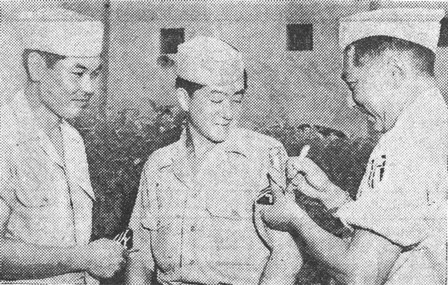 Eichi Nakazono, left, and Masato Sugihara, right, remove the sergeant's stripes of William T. Nago when the three Nisei received
word this week of their direct commission as second lieutenants. The new looies are stationed in New Delhi.
Eichi Nakazono, left, and Masato Sugihara, right, remove the sergeant's stripes of William T. Nago when the three Nisei received
word this week of their direct commission as second lieutenants. The new looies are stationed in New Delhi.
|
Nisei Interpret Allied
Terms To China Nips
By M/SGT. FRED FRIENDLY Roundup Field Correspondent
CHIKIAN, CHINA - Speed was the keynote of the meeting here last week when Japanese Army representatives were told the surrender terms by Chinese military leaders, with negotiations hitting a fast pace from the time the enemy delegates stepped from their green and silver twin-engined transport shortly before noon until they left the following day, escorted by Chinese and American P-51's.
No sooner had the four members of the imperial staff and the four crew members set foot on land than they were whisked into two jeeps by their welcoming party, a junior Chinese officer, and taken to their quarters.
At 3 p.m. the four enemy officers, headed by Maj. Gen. Takeo Imai, bowed before Lt. Gen. Chiao, and Imai stated that he was the representative of Lt. Gen. Okamura, Supreme Commander of all Jap forces in China, and asked for the surrender terms.
THREE READINGS
A very small group of Chinese and American officers and enlisted men listened with intense interest as with bowed heads the Japs heard the terms of unconditional surrender, the terms which will strip Imperial Japan of every one of her rich possessions, except the homeland.
Each sentence was read three times, once in Chinese, then in Japanese and then in English. G.I.'s swelled with pride as the Nisei members of our forces would rise and interpret the terms.
The Japs listened only half-heartedly to the Chinese reading, until Gen. Chiao got around to names like Nanking, Shanghai and Canton, which sound the same in any language and the echo of each name was like a jab to the heart as it brought back the memories of cities our enemy has spent 2,000 days of war to take and keep. Now it is all over.
The Japanese general made it plain that he had no authority to sign for Okamura, but that he would carry the terms of surrender to him. The Chinese said they were aware of that, but ordered the general to sign a receipt for the document.
TOUCH OF HUMOR
There was only one touch of humor in the two-hour session and that occurred when the Japs were asked if they carried with them a letter of instructions from their commander. When they said they had no such letter, there was a long electric silence until the Japs stated "But we have our special orders with us." All the G.I.'s looked at each other and grinned. The orders, however, weren't mimeographed, but were written on long white sheets of paper.
That night Chinese and American staff members conferred with the Japs on the logistics of air fields and ports in what was formerly Jap-held territory. The next day Imai flew back to Nanking to deliver terms to Okamura.
‘Critical Score’ Of 74 Forecast By NYC Paper
WASHINGTON - (ANS) - A new and lower critical score will be put into effect just as soon as it is determined that Japan will abide by the surrender terms, it was disclosed by the Army this week.
Maj. Gen. Stephen M. Henry, assistant chief of staff for personnel, said the score will then be progressively lowered at a rate guaranteeing there will be no empty berths on ships returning to the U.S., the United Press reported.
The Army has not made the new score public, but screenings of 75 point men from shipments to the Pacific clearly point to 75 as the next critical score. The New York Herald Tribune stated that men with scores above 74 should be home as civilians by Christmas. The newspaper said its information came from a high War Department source, which also predicted demobilization will be greatly accelerated within a matter of days after Gen. Douglas MacArthur's entry into Japan.
USAAF officials also disclosed that the Air Forces, now 2,300,000 strong, will discharge more than 1,400,000 men the next year. Officers will be eligible for discharge when their services are no longer required, at scores set at 36 for flight officers; 42 for second lieutenants; 58 for first lieutenants; 65 for warrant officers and 70 for captains and officers of higher rank. Enlisted men still require 85 points.
Meantime, Rep. Paul W. Shafer (R.-Mich.) criticized the point system as "grossly unfair" and proposed that all Army men with two years service be discharged. He asserted 5,000,000 men could be released on this basis.
INDIA-BURMA VETERAN SUGGESTS ‘WHAT TO TAKE HOME’
By CPL. RAY LOWERY Roundup Gift-Wallah
Our stay in this lovely theater has endeared us to its charm and quiet simplicity. We have grown to love its quaint customs and the cheery mien of its people. The lure of the Orient has put its finger on us, but fortunately we'll be able to wriggle clear before the grip tightens. Soon the aura of romance which has characterized our meetings with yogis and dhobis will be replaced by the gentle chidings of frustrated dependents who have read in the newspapers how homecoming Servicemen must be handled.
These well meaning people will doubtless be glad to see us, provided that we, like Marco Polo, bring back some baksheesh from this fabulous clime. Until the atomic bomb was invented very few of us had been able to buy marble or ivory reproductions of the Taj Mahal. It is now impossible (repeat impossible) to leave a bazaar without being forced to take along some gift. Name your own price. Or don't name one, and the shopkeeper will cheerfully settle for a cigarette.
ALCOHOLIC CURES
First for acquisition on our packing list is a resident char wallah. He ought to cause a stir in the old office when he announces in his stentorian whisper: "Char-lao. Luvely cikes. Bootiful char." The charming habit of sitting cross-legged and spitting asthmatically while he dispenses libation will soon be all the vogue in A&P markets.
A collection of scorpions and jackals ought to be just the thing to present to an uncle who is an incurable alcoholic. His tipping episodes will be enlivened by a few real horrors to crawl around his sitting room, although he may find it necessary to inoculate his proboscis with krait venom to maintain its hitherto brilliant lustre. Universal Pictures will undoubtedly be interested in renting these horrors for use in movies with Lon Chaney, Jr.
|
FOR ‘THE GIRL’
For the girl next door, who imagines that India is a land of romantic, princely cavaliers who occasionally mobilize magic carpets to rescue u=indescribably beautiful (and diaphanously dressed) joys like herself from the clutches of rival harem proprietors, we will take a selection of cotton sarees (silk ones still are too expensive). These utility garments, which can be used equally effective in the role of underwear, mural decorations, mosquito bars or something to wrap around the baby, ought to keep our favorite chin-up girl amused - or guessing - for quite a time.
A gift for here kid brother is rather more difficult. He is one of those queer offspring who will butt in when we are trying to describe the Battle of Calcutta to his lovely sister, and then demand hush money, or he'll tell how it really was. The only gift for him is a kukri with a razor edge, in the hope that the little tyke will cut his throat.
TEA AND TIGERS
The music-loving soul of our younger sister must not be forgotten. For here we should take along a veena, which is a sort of a guitar. As a decoration it is charming, elaborately inlaid with silver, resting on a green lacquered base. Played at a distance, in a high wind, it is guaranteed to soothe the savage breast, although it is hardly a thing to leave in the vicinity of nervous persons.
Nothing is more apt to please our ever-patient dad than a round of chota-pegs, frosted and reeking with the tang of a Kipling tale told at sundown. For our dear mother, who has written us 720 V-mails, a generous supply of savory Assam tea. If there is a wife, what could be nicer than a mess of betel-nut to serve at her next bridge luncheon?
That takes care of about everybody except the chairman of the draft board. For him, a couple of Bengal tigers - preferably hungry ones with ravenous appetites.
‘Duration’ Date Congress Job
WASHINGTON - (ANS) - It's up to Congress, men, to decide what "duration" means in the phrase, "duration and six months."
That's the word from Selective Service, which handled the mechanics of getting you in the Army in the first place.
Earlier, President Harry S. Truman said he did not intend to proclaim cessation of hostilities or end of the national emergency in his coming V-J Day announcement.
These matters of "duration," he said, will be the problem of Congress, but he advised against too much haste.
A Selective Service spokesman told the Associated Press that all drafted men are entitled to release at the end of the "duration and six months," but he added that only Congress can say when the duration is finished and the six months start.
He said that he presumed that when Congress decides to declare the "duration" completed, it will make some provision for occupation troops. Otherwise, he pointed out all will be scurrying home within six months.
So far he declared no legislation to define "duration" has been introduced in Congress. Omar B. Ketchum, legislation representative of the Veterans of Foreign Wars, said he will press for a clarification as soon as Congress reconvenes.
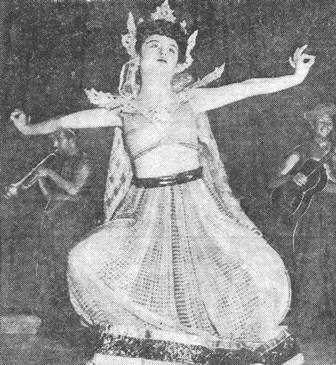 Meet "Miss Atom Bomb" so chosen by Calcutta G.I.'s who saw the Oriental beauty pictured above in the Entertainment Production Unit's
Harem Holiday. Born of English-Portuguese parents in Hong Kong, her name is Sylvia Wright. She landed in Calcutta after the Japs,
uncouth characters, chased her out of Hong Kong.
Meet "Miss Atom Bomb" so chosen by Calcutta G.I.'s who saw the Oriental beauty pictured above in the Entertainment Production Unit's
Harem Holiday. Born of English-Portuguese parents in Hong Kong, her name is Sylvia Wright. She landed in Calcutta after the Japs,
uncouth characters, chased her out of Hong Kong.
|
‘ATOM BOMB’ DROPPED
ON G.I.’S IN CALCUTTA
CALCUTTA - Now it can be revealed that the Japs dropped an "atom bomb" on Calcutta.
This "bomb," however, was in the form (and what a form!) of a luscious bit of Oriental femininity by the name of Sylvia Wright, currently appearing in Entertainment Production Unit's Harem Holiday.
Sylvia's presence in Calcutta, which can be traced back to the "courtesy" of the Japs, is heartily applauded and appreciated by G.I.'s who have named her quite aptly, "Miss Atom Bomb."
Born of English-Portuguese parents in Hong Kong, Sylvia, with her mother, fled that city after it was occupied by the Japs. For 180 days and nights, and with the Nips in hot pursuit, Sylvia tramped through jungle and swamp before finally arriving in Calcutta.
"It was a horrible nightmare," Sylvia remembers.
Her winning personality, charm and energy caught the eye of an EPU talent scout at a party one night, and he quickly had her placed in Harem Holiday.
And everybody is quite happy about it.
NO, SAYS JOE
MANILA - (UP) - Gen. Joseph W. Stilwell, who was recalled from his Army command in China after a dispute with Chiang Kai-shek, declined China's award of the Blue Sky and White Sun Medal.
Asked about it, Stilwell said, "I have not accepted any foreign decorations whatsoever."
SURPLUS GOODS HEAD EXPECTED HERE SOON
WASHINGTON - (UP) - The War Department announced this week that Walter B. Schleiter of New York has been appointed field commissioner for India-Burma and China to dispose of war surpluses there.
Schleiter, on leave as vice president of Mulleur and Phiipps, Ltd., spent 17 years as Bombay manager of that firm. He is expected to leave for New Delhi by September.
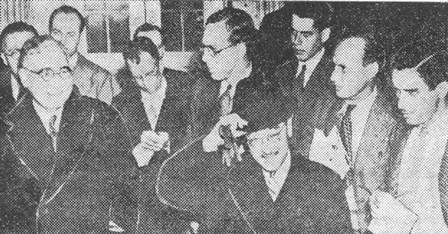 Here are the two Japanese "peace envoys" who smiled while Pearl Harbor burned.
Kichisaburo Nomura and Saburo Kurusu, when this picture was taken on Dec.7, 1941, had just completed conferences with Secretary of State
Cordell Hull designed to "maintain peace." At the very same hour, Jap planes were attacking U.S. installations in the Pacific.
Here are the two Japanese "peace envoys" who smiled while Pearl Harbor burned.
Kichisaburo Nomura and Saburo Kurusu, when this picture was taken on Dec.7, 1941, had just completed conferences with Secretary of State
Cordell Hull designed to "maintain peace." At the very same hour, Jap planes were attacking U.S. installations in the Pacific.
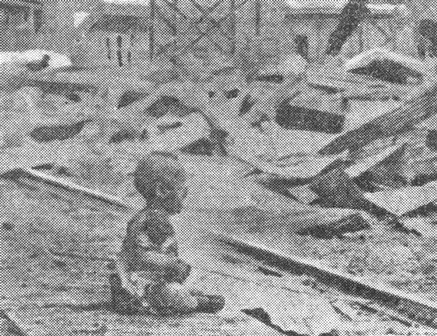 Here is a powerful and decisive answer to present-day critics of the atomic bomb. This picture, termed one of the best of the war,
was made shortly after Jap planes attacked Shanghai in August, 1937.
Here is a powerful and decisive answer to present-day critics of the atomic bomb. This picture, termed one of the best of the war,
was made shortly after Jap planes attacked Shanghai in August, 1937.
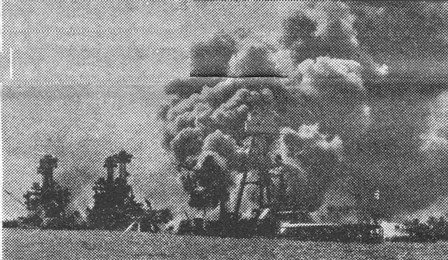 Three victims of the Japs' sneak attack at Pearl Harbor were these U.S. battleships: West Virginia, Tennessee, and Arizona.
Three victims of the Japs' sneak attack at Pearl Harbor were these U.S. battleships: West Virginia, Tennessee, and Arizona.
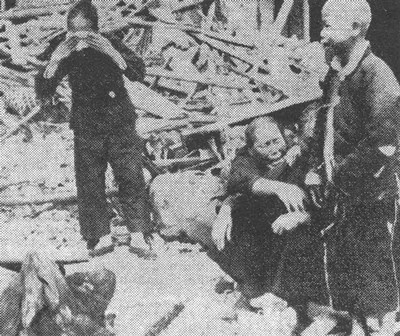 Chinese civilians learned, in a strange and horrible way, the "benefits" of the Greater East Asia Co-Prosperity Sphere as offered by
the Nips. A Jap bomb has just destroyed their home, killing their relatives and friends.
Chinese civilians learned, in a strange and horrible way, the "benefits" of the Greater East Asia Co-Prosperity Sphere as offered by
the Nips. A Jap bomb has just destroyed their home, killing their relatives and friends.
|
|
BRAMBLES |
By SGT. CHARLES WARREN CLARK
Roundup Staff Writer
Diane Sandra Fine, currently starring in G.I. Movie Weekly No. 103, is the most beautiful and most talented actress of the year, according to at least one critic who saw the film at Delhi Headquarters this week. The critic is undoubtedly biased however, for he's T/4 Bernard Fine and proud father of the new cinema star.
Diane Sandra, just 17 months old, was selected by the Army Pictorial Service to appear in the By Request feature of the G.I. Movie after papa Fine, an Army mail clerk from Philadelphia, wrote that he had never seen his young daughter. So it was not only Diane's debut but also her father's first glimpse of his beautiful 12 points in action. And she gave a wonderful performance, cooing and smiling toothlessly and chewing her tongue inelegantly though charmingly.
After the film was shown the first of a half-dozen times, backwards and forwards, the excited father's only intelligible comment was, "Cute, isn't she? Run it again."
VU2ZV HAS OWN ‘INFO, PLEASE!’
G.I's up Assam way are enjoying their local version of America's famous Information, Please! radio show.
It's a regular Sunday evening program called Item-Easy, sponsored by the Assam Information and Education Council under the direction of Capt. Don Torry, and broadcast over VU2ZV, the AFRS station at Chabua.
Major Vernon Bunce is the Clifton Fadiman of the show, staged at a different unit each week and broadcast by remote control to the entire area. Questions all come from the men in the area with prizes given for those used.

|
HAND RECOGNITION
Dear Roundup: We represent one of the unfortunate outfits that has involuntarily resided in Burma for two years building and maintaining the Ledo Road. There have been numerous occasions in which we have trudged out on this same road, bearing picks and shovels, and attempting to keep The Road open for convoy traffic by improving the drainage system.
We have all read Phil "The Feet" Whelan's letter in which he requested having his feet named after some glamor girl. We have worked hard with our hand tools and believer they are deserving of equal recognition.
Any suggestions will be appreciated. - Pvt. Bill Osterfeld, APO 218.
BOOST FOR WOUNDED
Dear Roundup: It is my opinion that any man in any of the Armed Forces who was wounded in combat with the enemy should receive first discharge priority, regardless of his point score, his age, his time in service, his time overseas, or the number of his dependents.
I wonder what the rest of your readers think about that, now that the war is over?
To keep the record straight, I am not one of the wounded. - Pvt. Jack Savitsky, APO 431.
|
G.I. BARD WOULDST SECTION EIGHT FINK
DEAR EDITOR:
|
FINK STINKS!
I don't say this to discredit Such a splendid rag you edit, But I'm rather glad I said it, and you'll note it's underscored. Journalistic halitosis That assails your Fink, Osmosis, Is supplied in smaller doses by most any psycho-ward. Please refute the current rumor That he claims a sense of humor And confess his mental tumor rates a plug for Section Eight. If the Army won't reject him From Supply when I select him as my salvage candidate? Cpl. Robert B. Charles 330 Engr. Regt. Co. B APO 218 |
Dear Cpl. Charles:
Old Os' showed your most convincing poem to The Boss. He laughed sardonically.
"Fink," he roared, "it's simply no use. It's not going to get you home. All you have is 77 points. Contrary to the corporal's poetic opinion, you're indispensable. No one else left around here to empty my wastepaper basket. I've heard from unimpeachable sources that your bearer has packed your barracks bag. Might as well tell him to unpack it.
By the way, corporal, are you any relation to Lt. Charles Charles of Terry and the Pirates? Your frothy approach to your subject is delightfully reminiscent.
Ah, but old Os' digresses.
It was his intention, upon scanning your whimsical doggerel, to comment upon G.I. poetry in the I-B Theater and its contribution, if any, to the arts.
That fellow who stands in a corner of the Roundup office idly raking his lips with distended fingers and producing a bubbling sound like Shep Fields' Orchestra is our poetry editor.
Speak up, my good man.
Poetry Editor: "Brrrrrrscoffffphhh."
Old Os' will translate that significant statement for you, corporal. What the poetry editor is trying to say is that Byron Keats and Shelley, to name a few, would jitterbug in their shrouds like dervishes if there were some occult means by which he could read them some of the poems submitted to the Roundup.
Lord love the G.I. poet, the impulse which motivates him is generally on the sublimist plane. Pen clutched feverishly in hand, inspiration burning like an all-consuming flame, forehead glistening with the sincerity of his efforts, he writes tenderly of home & mother, passionately of freedom & The Flag, bitterly against intolerance & bigotry.
It is unfortunate, however, that those with the most profound thoughts often cannot express themselves in the muse, for the G.I. in the brambles, with time what he has the most of, occasionally reaches into the innermost recesses of his heart and mind and hears The Message.
On the other hand, old Os' knew an old wine bum along the San Francisco waterfront who cadged dimes by batting out beautiful poetry at a moment's notice in Embarcadero grog shops. His name, as old Os' recalls, was Smelly - and not because he perfumed the air like Chanel No. 5.
Just what all this proves - or doesn't - is rather vague, of course. Confidentially old Os' lost the frayed thread of his thought several paragraphs ago. He was on the verge of telling a Little Audrey joke, but reasoned that you had probably heard it and, anyway, the Chaplain might object.
But what the hell, another two columns of type are filled. - Sincerely, T/7 OSMOSIS FINK
The Roundup is a weekly newspaper of the United States Forces, published by and for the men in Burma and India, from news and pictures supplied by staff members, soldier correspondents, Army News Service and United Press. The Roundup is published Thursday of each week and is printed by The Statesman in New Delhi and Calcutta, India. Editorial matter should be sent directly to Major Floyd Walter, Hq., U.S.F., I.B.T., APO 885, New York, N.Y., and should arrive not later than Saturday in order to be included in that week's issue. Pictures must arrive by Friday and must be negatives or enlargements. Stories should contain full name and organization of sender. Complaints about circulation should be sent directly to Capt. Drexel Nixon, Base Section APO 465, New York, N.Y. Units on the mailing list should make notification of any major change in personnel strength or any change of APO.

AUGUST 30, 1945
|
|
Adapted from the original issue of India-Burma Theater Roundup
Copyright © 2015 Carl Warren Weidenburner
TOP OF PAGE PRINT THIS PAGE ABOUT THIS PAGE SEND COMMENTS
PREVIOUS ISSUE CLOSE THIS WINDOW NEXT ISSUE
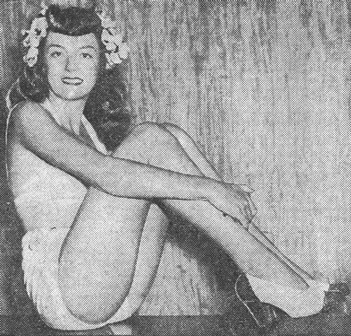 Nineteen years ago, dressed only in a diaper, the beauteous gal perched above won a National Beauty Contest. Recently she donned a few more clothes and copped the title of Miss Stardust. Her name is Eleanor Cahill and she's a model. If she models diapers, we'll take two dozen.
Nineteen years ago, dressed only in a diaper, the beauteous gal perched above won a National Beauty Contest. Recently she donned a few more clothes and copped the title of Miss Stardust. Her name is Eleanor Cahill and she's a model. If she models diapers, we'll take two dozen.
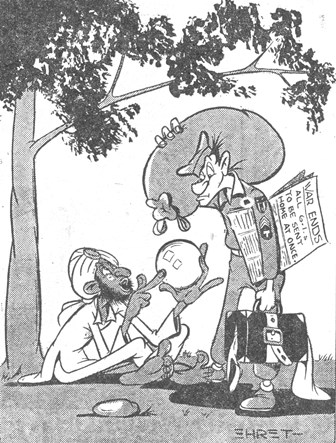 "Ah! Good news, sahib. You will travel soon."
"Ah! Good news, sahib. You will travel soon."
